Advertisement
Okay, so the last one was totally not the last antedated one, but whatever. Thanks to everyone for all the comments-- they're great to see, so keep 'em coming if you have the time. So, I'm dating this the 10th, it's actually the 12th, and that makes tomorrow only one of the coolest days out of the year. Some friends have said that we will be going to a karaoke bar tomorrow night to celebrate. I anticipate not knowing any of the songs but being made to sing something anyway. Hopefully, this will not come to pass. However, more importantly, I'm going to attempt to understand Poland and its attitudes towards World War II, Russia, and, to some extent, what I found puzzling and somewhat worrisome about its relationship with its Jews.
I finally decided to make this post because of a few exhibits we saw. One was the Royal Palace, one was the film at the Warsaw History Museum, and one was the Warsaw Uprising Museum. I will have pictures at the end of the post, mostly from the lattermost mentioned.
World War II
I don't think anyone outside of the Eastern Front of World War II truly understands the destruction of war unless they have personally served in the military or lost a loved one to it. Those all over Poland and in Russia grow up with it. The closest I think any of us could come to it would be to remember September 11th (or other large terrorist attacks), or if we are familiar with the Battle for Britain, to think about all the effects of the aerial bombardment. Without detracting from those experiences at all, even the Battle for Britain cannot reach the destruction felt in Warsaw.
I know I was not the only one troubled on this trip by the appearance that the Warsaw of today was largely skipping over the Ghetto Uprising in favor of the Warsaw Uprising. What of Poland's Jews? Did they not matter so much after all? I think it is fair to say there was some Polish racism against Jews during the war. I think today Poles are generally not racist (of course, in every society there are some who are). But I could not figure out why the Ghetto Uprising memorial was.. well, the Warsaw Uprising one was just much bigger, and there had been plans for a museum of the history of Jews in Poland across the street from it that was supposed to be finished already but hasn't been. Why? Why wasn't there more of a remembrance? And what was this Warsaw Uprising, which, to my shame, I was wholly unfamiliar with? I think the reason the Ghetto Uprising seems to be pushed aside somewhat is because the effects of the Warsaw Uprising were just.. huge. The Jews aren't forgotten so much as the Uprising just covers a large part of the screen because it was so big.
Warsaw, unlike Krakow, held out from the beginning. I don't think it lasted very long, but the Nazis just bombed it and fired at it and destroyed it. They... they were barbarians in every sense of the word. The caretakers of the castle saved as much as they could, rolling up canvasses of paintings, grabbing bits of furniture, etc., and hiding them-- all throughout the city they were hidden, and some pieces were even hidden in Canada. But the building was just destroyed, so you can go through and the tour guide pointed out an original versus a replica of a wall-mounted candlestick. Almost the whole building was replicas. This is also true of the whole city. There was significant destruction in the initial battle, but much more in the aftermath of the Warsaw Uprising.
The Warsaw Uprising was started by the Home Army, which was the army of the underground government (well, it was actually in London at the time). At 5pm on August 1st 1944, the city began to fight. I think a plaque I saw said that about 25,000 soldiers started it, but many many more people joined them. For three months they fought, occupying parts of the city, trying to hold onto their side of the Vistula.
What they accomplished, despite their ultimate defeat, was truly impressive. They had a working postal service, with boy scouts as mail carriers, and using official postage and everything. Women worked as nurses and sewer guides, because it was easy to get lost in them and they had an easier time moving through them (narrow and short). They shot footage and showed them as newsreels, and published newspapers (they had had underground newspapers the whole time, but in the Uprising they didn't have to hide them so they printed more). The whole city basically was involved. They didn't have enough of supplies, but the Allies did try to drop some. America's drop was particularly sad-- by the time they made the drop, the Home Army had been pushed back so much that only 20%!l(MISSING)anded within the zone occupied by them, and 80%!a(MISSING)rmed the Germans.
But the Nazis kept closing in on them. They slowly cut down the size of the territory the Home Army occupied using the most barbaric of tactics. The Poles had quickly erected barricades around the whole area they occupied, which made it easier to defend. And they were good at taking out tanks, particularly with Molotov cocktails (although they avoid the term, preferring something like "bottle explosives" or something). But the Nazis started to force other Poles to be human shields, walking ahead of or sitting on the tanks. The worst story was the massacre at Woła. The Nazis simply murdered men, women and children. All the bodies were burned, so they had to estimate the death toll, roughly 50,000, by measuring the ashes.
There was one room in the Uprising Museum where they had a video interview playing of a soldier who was there. His name was Matthias Schenk, and he was 17 and a Belgian the Nazis had drafted into the Werhmacht because two of his brothers were in the Resistance. He was the only one who agreed to be interviewed. His story was heartbreaking. According to him, SS officers basically, as was their wont, went around committing atrocities. He and a fellow soldier let children from a school go past them. SS officers caught them on the stairs and killed them, initially shooting but then clubbing them to death with their rifles to save bullets. Five hundred children.
He also told of a time when he went into a basement and saw a priest and a couple nuns, and the priest was saying Mass. He is Catholic, so he went up and took communion, then left. He came back to find soldiers had stripped the priest and were taunting and beating him, so he intervened and took the priest to the command station where he thought he would be safer.
He was also at a Polish field hospital. Wounded German soldiers requested leniency for the Poles, who had treated them well. Schenk told the nurse to leave. Later on, in the square of the Old Town, he saw a number of nurses and doctors walk naked to the gallows. This was a scarred, hurting man, a young man who hadn't really done any of these things. And now he is old, and he has been involved in charitable activities for Poland. I wonder what has become of those who acted as barbarians and animals, who gloried in the blood they spilt.
The Warsowians finally had to surrender after three months, although at that point the Nazis had finally decided to recognise them as prisoners of war instead of just shooting them. They had evacuated the city as much as they could, and whoever was left the Germans cleared out. Then, at Hitler's order, they spent three months razing the city to the ground. They destroyed 80%!o(MISSING)f Warsaw, and what was left was mostly skeletal frames of buildings. It was incredible-- I have never seen such images. I didn't realise how new all the old things around me were-- they were all reconstructed after the war, the old town from some of the paintings saved from the palace.
Check
this page for some before and after images.
I cannot begin to do the events justice. But this is the legacy of Warsaw, and it is an honorable one, if sad.
What about the Russians?
Poles are not overly fond of Russians, and while I thought this was basically a reaction to both old animosities and the partitions and then the imposition of communism, I think it also comes very strongly from wartime and post-World War II.
The part of the story above that I did not mention was that the Soviet Army was 20 km away when the Uprising began, and by it's end were basically at the other side of the Vistula. But they did nothing. They waited and watched while Warsaw suffered, while Warsaw was razed, and did nothing. And after the war, they fought to impose communism (it did include deaths-- 3 years of unrest and resistance) and punished officers of the Home Army while exaggerating the contributions of the (much smaller and more terrorist-like) communist resistance. They rewrote history and forbade any commemoration of the Uprising.
I will talk about our trip to Gdansk soon, but from it I will say that 90%!o(MISSING)f Gdansk was destroyed-- almost totally by the Soviets.
I guess I'd be a little pissed, too.
Images
1. A photo of a monument-- the big cylindrical stone in the foreground is the original, destroyed in the war.
2. Prewar photo of the Old Town and recreated ruins- Uprising Museum.
3. Rebuilt mermaid statue (mermaid is the symbol of Warsaw) in the Old Town square. The woman who modeled for it was a field nurse killed early in the Uprising.
4. Images from the Uprising as if they had just been developed.
5. The intertwined P and W stand for Poland Fighting and are all over the city of Warsaw.
6. A recreation of a sewer. Sometimes the Nazis poured sand into them to make people travelling in them drown in the filth. Uprising Museum.
7. Photos of Warsaw, razed. Uprising Museum.
8. Images of graves all over the city. The whole city became a graveyard. Uprising Museum.
9. Recreation of an Exhumation tent from Woła. Each block has a form with information about the remains. Some could be identified, often by effects; many could not be. Estimated at 50,000 people killed and burned, although some estimate as many as 100,000. This in approximately 3 days in August.

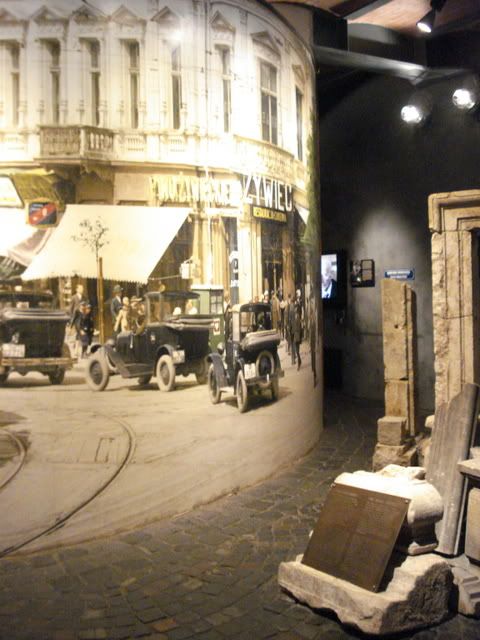

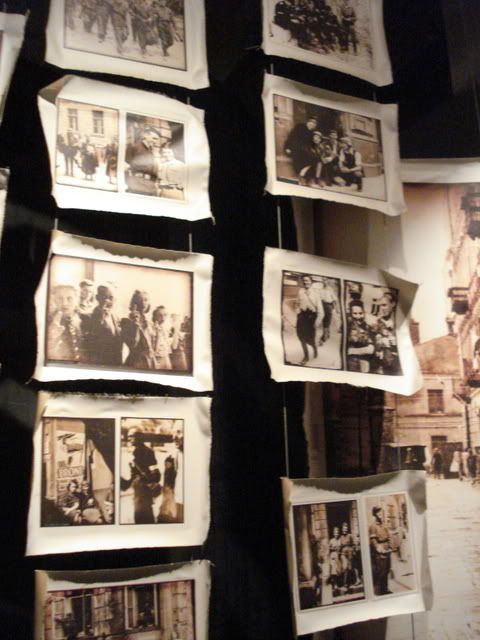
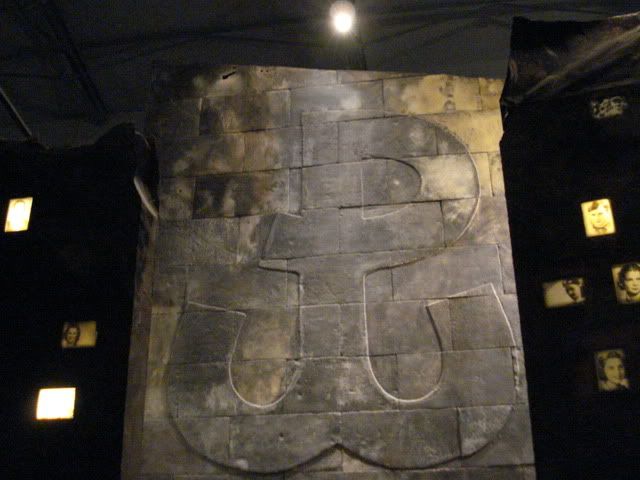
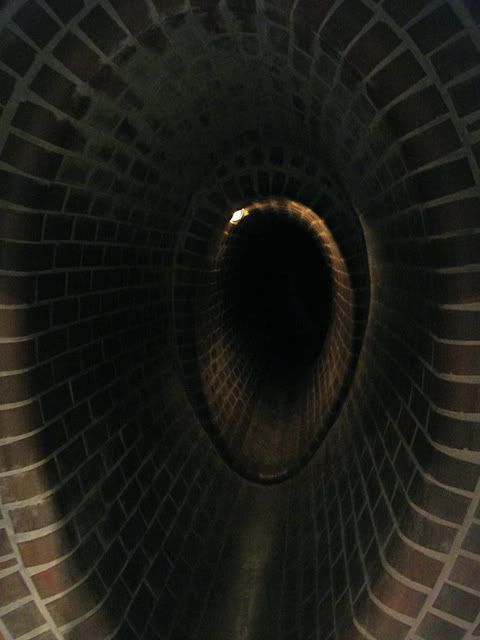
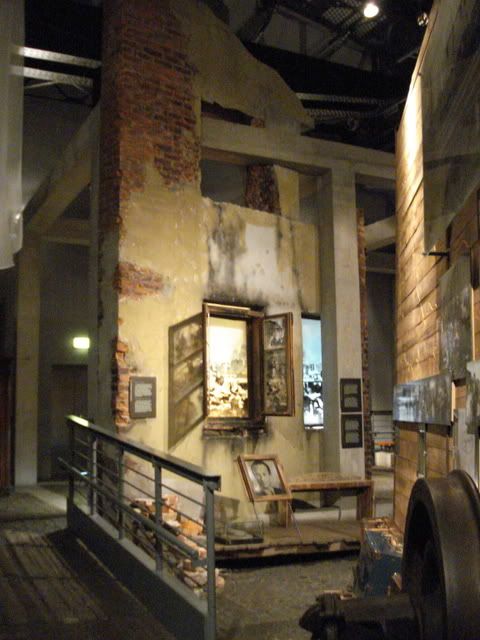
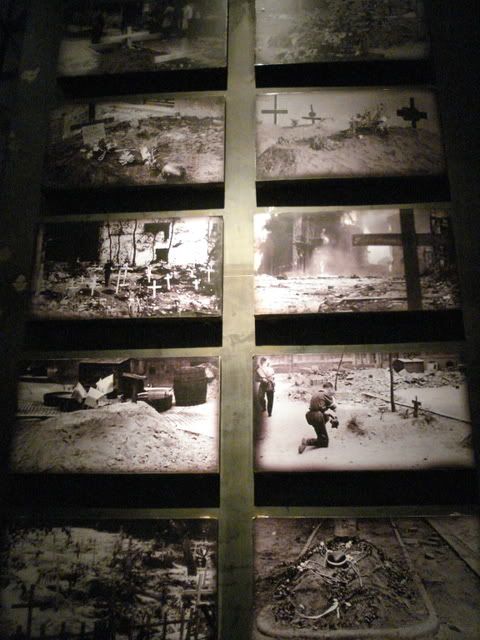
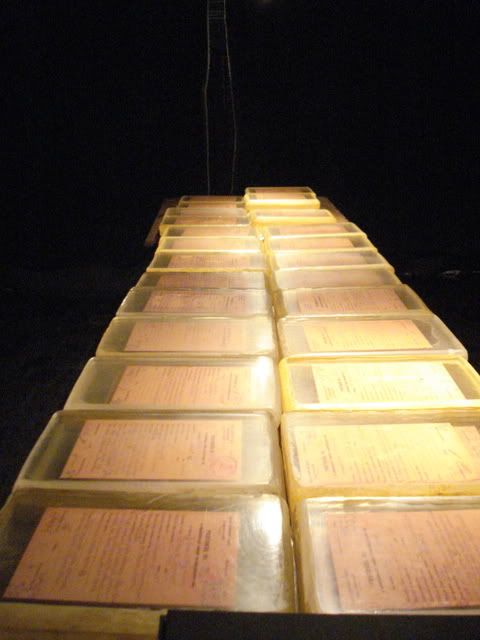
----
Anyway, I have tried to go over a very difficult area of Polish history and culture with sensitivity and understanding. Next post will either be of Gdansk or more reflections on Polish culture (including reggae and close-toed shoes).
best and bye for now,
~Nadja
Advertisement
Tot: 0.09s; Tpl: 0.012s; cc: 9; qc: 35; dbt: 0.0415s; 1; m:domysql w:travelblog (10.17.0.13); sld: 1;
; mem: 1.1mb









Linda
non-member comment
Happy Birthday Sweetie
I'll be back later to read this post properly and take a good look at all the photos, but I just wanted to wish you a very Happy Birthday, sweetie. Have a great day!